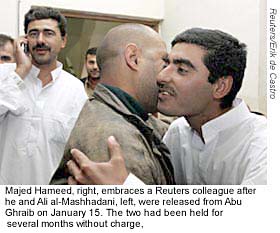New York, March 24, 2006—The Committee to Protect Journalists welcomes U.S. officials’ pledge this week to begin prompt, high-level reviews of cases in which journalists are detained by troops in Iraq. CPJ documented seven cases in 2005 alone in which U.S. forces detained Iraqi journalists for periods of many weeks or months without charge or due process.
In Baghdad, Maj. Gen. John Gardner told Reuters on Tuesday that the U.S. military has established a new goal of reviewing cases of detained journalists within 36 hours. U.S. troops across Iraq have been ordered to report the arrest of anyone claiming to be a journalist to Gardner personally, and news organizations will be given the chance to vouch for their journalists, he told Reuters. Legitimate journalists, he said, would be released swiftly.
“Once a journalist is detained,” Gardner told Reuters, “it comes to me.” The change, he added, is designed to ensure that “we don’t hold someone for six or eight months.”
In Washington, a Pentagon spokesman confirmed broad elements of the policy change in an interview with CPJ late Thursday. “The intent is to bring better visibility and quicker attention to the [U.S. military] leadership when a journalist is detained,” said Bryan Whitman, deputy assistant secretary of defense for public affairs.
Watching or filming combat and meeting insurgents are not in themselves grounds for arrest, Gardner said. In at least five cases documented by CPJ, the detainees were photojournalists who drew the military’s attention because of what they had filmed or photographed.
U.S. officials said that they recognize the right of journalists to independently report news across Iraq. “We obviously do not want to discourage the press from being present,” Gardner told Reuters. “We are aware that journalists, by the nature of their duties, often will be at the scene of attacks when they occur,” Whitman told CPJ.
CPJ research shows journalists have been held for as long as eight months—without charge or public disclosure of evidence—before being released. In addition to the prolonged detentions, CPJ has received reports of numerous other detentions of shorter duration. Most detained journalists have been Iraqi citizens working for Western news organizations.
Last September, U.S. Sen. John Warner of Virginia secured a public promise from the Pentagon to respond to CPJ’s concerns for journalist safety in Iraq. At a hearing of the Senate Armed Services Committee, Warner urged the Pentagon to respond to letters sent separately to Defense Secretary Donald H. Rumsfeld by both CPJ and Reuters. Three Reuters journalists were held by U.S. forces for several months last year before being released without charge.
“We’re pleased the military has taken these steps to recognize the challenges that front-line journalists face in reporting on the conflict in Iraq,” CPJ Chairman Paul Steiger said. CPJ continues to urge military officials to promptly disclose supporting evidence whenever journalists are held.
“I am very encouraged,” Reuters Global Managing Editor David Schlesinger said this week in response to Gardner’s statements. “The U.S. military can work better with professional journalists doing their jobs under difficult circumstances.”
Of the seven long-term detainee cases documented by CPJ, all but one journalist was eventually released without charge. One Iraqi journalist working for CBS News, Abdul Ameer Younis Hussein, remains in jail; this week, U.S. authorities said for the first time that Hussein would face trial before an Iraqi judge. The case is scheduled for April.
Hussein was arrested after being wounded while filming clashes between Iraqi insurgents and U.S. troops in Mosul. The tape that was in his camera at the time of his arrest may be part of the evidence used against him, CBS Baghdad Bureau Chief Larry Doyle said. He added that U.S. authorities have also indicated to him that they believe the Iraqi journalist may have been “instigating a crowd” in Mosul before his arrest.
